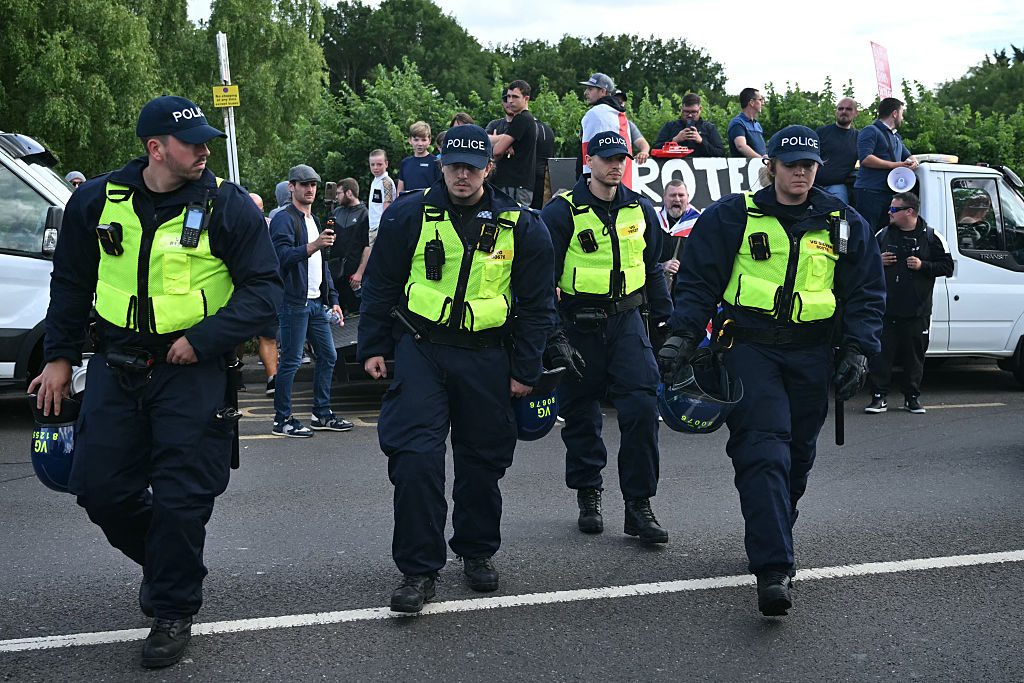Earlier this week, Conservative MP Neil Hudson told Newsnight: “We are going to have a summer of riots. You can just feel it. It is a tinderbox.”
This isn’t just idle talk from a backbencher or a Tory rattled by social media chatter. The warning has been echoed at the highest levels of government. At a recent Cabinet meeting, the Prime Minister reportedly told colleagues that Labour must begin repairing Britain’s “social fabric” if it hopes to avoid a repeat of the riots in Southport, whose first anniversary is fast approaching.
Since the violence in Southport and Ballymena, further unrest has broken out in Epping, following allegations that a migrant sexually assaulted a local girl. The protests which have flared in the wake of these incidents are becoming more frequent and harder to control. In Epping, police have adopted a new strategy of “community activist policing”, aimed at managing unrest through symbolic displays of unity and coordinated demonstrations.
However, footage has since emerged seemingly showing Essex Police bussing in counter-protesters. The force denied bringing activists from Stand Up to Racism to the Bell Hotel in Epping, despite claims from anti-migrant demonstrators that their arrival sparked the 17 July violence. After video surfaced of Essex officers escorting the group from a nearby station to the hotel. Assistant Chief Constable Stuart Hooper defended the move, saying police have “a duty to facilitate free assembly”. Last night, the force said the initial claims were “categorically wrong”.
Bringing in counter-protesters has become another tool for police forces trying to manage rising local tensions, offering not just crowd control but a counter-narrative. In Southport — and in Epping, before counter-protesters arrived — demonstrators frequently accused police of shielding alleged attackers. By introducing an opposing group, police can claim they are mediating between two sides, rather than standing against one. At the same time, the presence of counter-protesters helps frame the original demonstrators as far-Right or racist, giving police greater political and operational cover to use force against them.
This strategy is part of a more fundamental problem: the perception of two-tier policing. During riots in Harehills in Leeds last year, police withdrew entirely once it became clear they had become the focus of the unrest. In Birmingham, disorder prompted police to pull back at the request of so-called “community leaders”. In contrast, the riots in Southport — and now Epping — were met with force.
The Harehills unrest, rooted in a flashpoint over a social services intervention in a Roma community, was unlikely to spread; a heavy police presence only inflamed an isolated situation. But the riots in Southport, Epping, and Ballymena reflect something broader: a pattern of unrest that could ignite anywhere there’s a migrant hotel and a volatile local mood over immigration. Each one is a potential domino, and the state cannot afford to let them fall.
No. 10 is terrified about the potential fallout. The Home Office’s dispersal strategy has placed migrant hotels in almost every part of the country, from coastal towns such as Skegness and Scarborough, to suburbs on the edge of London, to small market towns in the Midlands and North. In each case, the ingredients for disorder are broadly similar: a sudden influx of migrants, little consultation with the local community, and a sense that neither police nor politicians are willing to act when serious crimes are alleged.
That is what makes the current moment so combustible. It’s not any single riot that threatens to define Britain’s future, but a rolling wave of unrest driven by the same unresolved grievances. If Keir Starmer wants to stop Southport from becoming the national template, he can’t rely on stage-managed protest theatre or careful message discipline. He must reassert control over Britain’s borders and restore public confidence that the law applies equally to all. Because once the police are seen not as neutral arbiters but as political actors, they lose legitimacy. And policing by contempt is a strategy that cannot hold.











Join the discussion
Join like minded readers that support our journalism by becoming a paid subscriber
To join the discussion in the comments, become a paid subscriber.
Join like minded readers that support our journalism, read unlimited articles and enjoy other subscriber-only benefits.
Subscribe